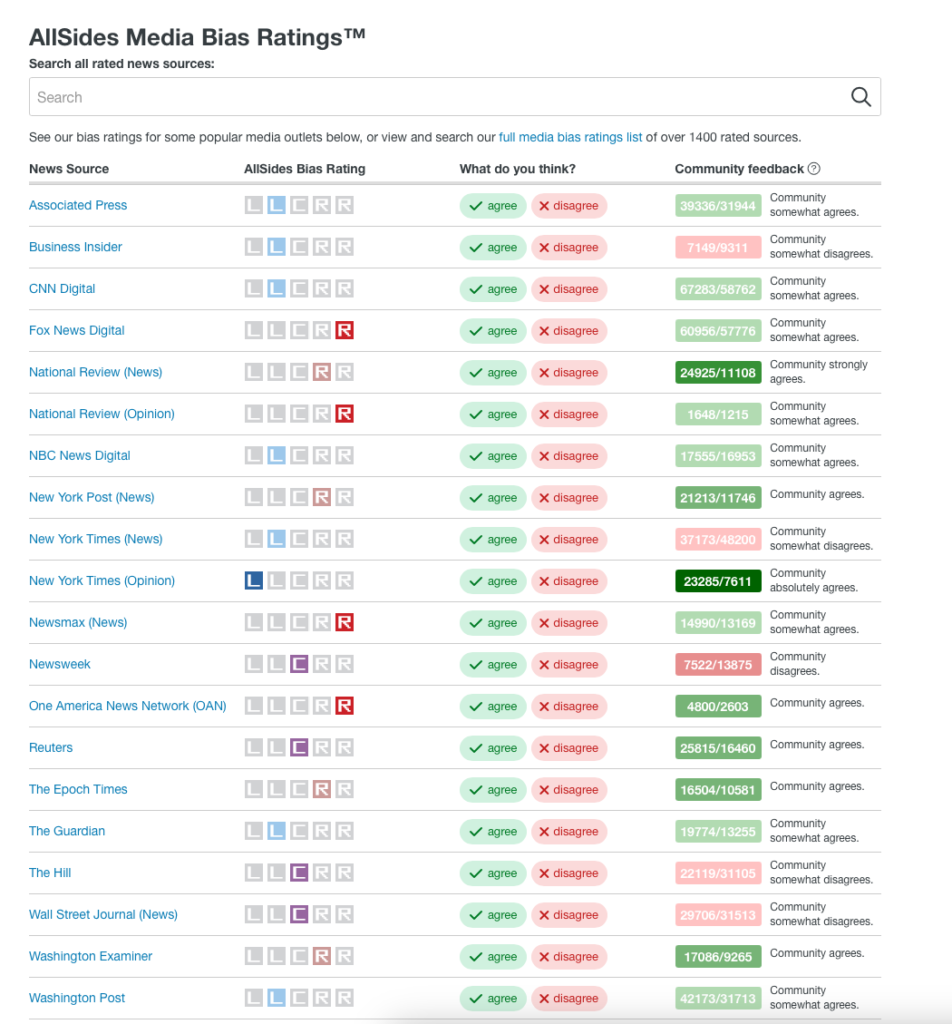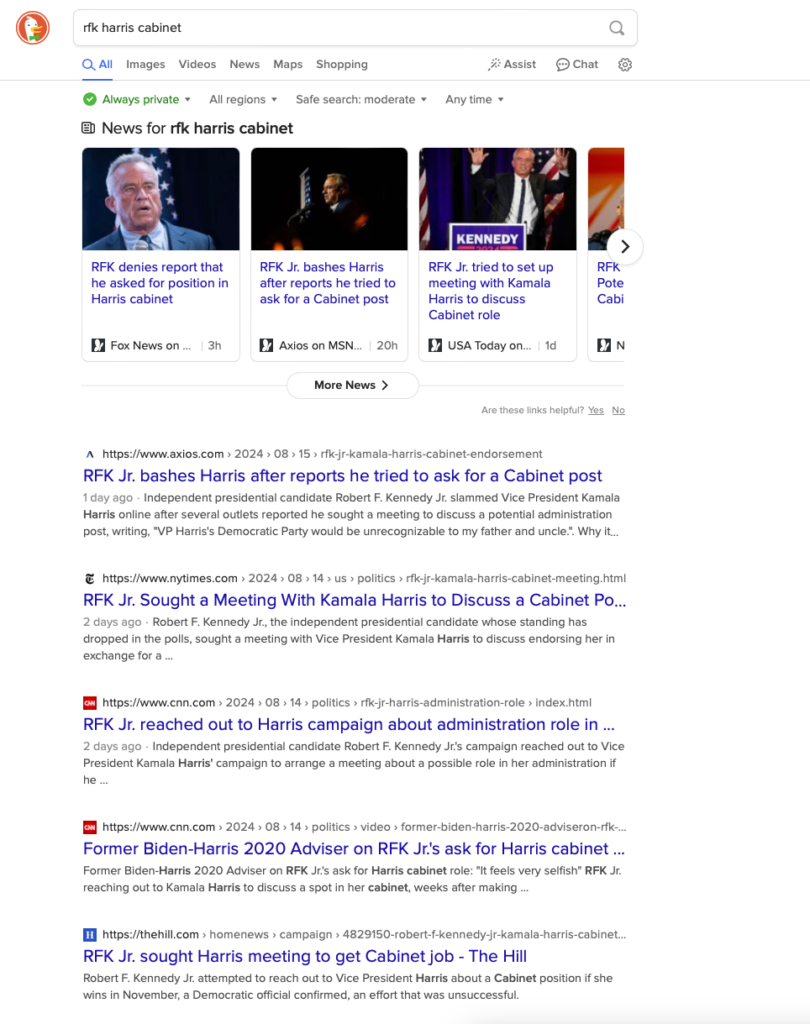“Google it.” Ask any question, and that’s the answer. I’m 61 years old and have worked an entire career in technology but I’m still in awe of the amount of information that is available on our computer, phone or tablet. Remember having to bike to the library, hunt through the card catalog and track down an actual book to research a topic? Today you can just “google it.”
I was not entirely surprised, but still disappointed when I read: “Google Admits to Omitting Trump Assassination Attempt from Search Autocomplete Feature.” on msn.com. Google states that this has been corrected. Please read the linked article to get the full context.
The article also states: “Google also claimed that an algorithmic error was responsible for broadcasting news stories about Vice President Kamala Harris, Trump’s 2024 rival, when users searched Trump’s name.”
This Post is Not Political
My promise to readers is that I will stay away from political topics. My goal is to educate, inform. This site is dedicated to helping readers grow and protect wealth to ensure a better financial future. So why am I writing about the news?
This is not a political statement, but I do believe it is important for all of us to be well informed. Read on if you agree, if not, check out the post on compounding. I don’t want to offend, but I do want to share my thoughts on how we can be better informed.
Many of us use Google as our starting point for information gathering. It’s easy to do, we’ve used it for years and it provides the information we need. If I’m arguing with my golf buddies about a particular song that show’s up on Brett’s playlist, I can say “Hey Siri, who sang Spirit in the Sky. This song was all over American Top 40 in the late 60’s and early 70’s. Siri does a Google search and serves up an article that tells me it was Norman Greenbaum. What?? Who?? I search google and find other sources. Yup, that’s correct. Who’d a thought?
I check with Google throughout the day for answers. I also use it for navigation in my car, and for email. Look at all Google has done for me. I trust Google.
How About Important Info?
While I can trust Google to tell me a fact like Brewer and Shipley sang One Toke Over the Line, can I rely on Google for fair and accurate information on all topics?
If Google somehow is making a decision about what information to show me (and not show me), how does that impact me? I would like to be shown all the information so that I can make my own decision. I don’t want someone to decide what I should and shouldn’t see.
Sounds Like a Conspiracy Theory
I thought you might say that. The article that I referenced above is from a left-leaning source. See more here from allsides.com.

Whether I lean left or right in my politics is not the point. The point is that I’d like to be able to get information about topics that help me form an opinion and Google has admitted that it has not provided its users with accurate results.
Put down the tin foil hat for a moment and think about this. Some think this is a political play by Google, which leans left, to present Google’s own perspective and influence readers. Others take Google at its word that this is a problem with outdated algorithms that Google will correct. Either way, the part that should scare us is that Google, our trusted source of information, is making decisions about what we can and cannot see.
Does This Matter
I think so. How many of us read beyond the headline, or, gasp, go to the 2nd page of search results. We’ve been conditioned to get our information quickly and efficiently. I type in Spirit in the sky and Norman Greenbaum pops up. I don’t even need to click or tap.

So yes, what appears and what doesn’t appear is important.
It’s Not Just Google
I wrote above that I was not entirely surprised when I read the article about Google. I’ve read similar articles in the past, but this one seemed to me to be especially concerning. But while Google gets called out here, think of the other places we get information.
I’m not on social media, but I have friends who get their news from a Facebook or Twitter feed. I read a lot from an app call Flipboard that aggregates stories based on my interests.
Most News Aggregators Biased to the Left, including Google, Apple, Bing. Read the article. It’s eye opening. Here’s a quick stat: Apple News Curates 1% of Articles from Outlets on the Right, 53% from Outlets on the Left.
Each of these sites and apps is making a decision about what we see and what we don’t see. Maybe we need another source.
It’s Not Just Politics
This is scary. A Researcher Found That Voters Might Be Less Racist and Sexist Than We Think—But Journalists Weren’t Interested in the Story. Here’s an excerpt:
Her conclusion from the studies — most of which took part in the American context — was optimistic. Voters don’t penalize female and minority candidates, in fact their first impressions are even more positive about female and candidates about some minority backgrounds.
“Voters aren’t negative — in some cases [are] even positive about women, about Asian candidates, and think the same about black candidates as they do about white candidates. It’s actually quite positive,” she told me in an interview.
But reporters by and large were not interested in her results. She took to X (formerly known as Twitter) and noted that although she spoke to many reporters to discuss her results, all but one called the stories off. One journalist she talked to even told her: “people aren’t interested in good news.”
Journalism Today
That’s a sad commentary about journalism today.
When I was a kid, I had a paper route. Almost every home in my neighborhood got the Boston Globe delivered in the morning, and the Salem News delivered in the afternoon. Good for me. Also good for journalism. They were selling lots of papers. How else would you get your news in 1975?
I don’t know anyone who gets a paper delivered today. We all get our news online. And all those online sites are competing for our eyeballs so the news has to be:
- Dramatic
- News we want to hear – it needs to have a perspective and it needs to be our perspective.
How many people do you know that go to both MSNBC and Fox equally – and enjoy both?
What Can I Do?
I was hoping you’d ask. I am naturally suspicious so I’ve done a lot of research over the years on this topic.
Unbiased News
I’ve been reading a lot on allsides.com. No surprise, I’ve linked them a couple of times here. Check it out and decide for yourself.
I like that allsides shows me a story and then includes links to how news outlets on the left, center and right covered that same story.

In all fairness, while google search did not autofill suggestions when I typed “rfk harris cabinet”, Google did show me articles from the Washington Post and CNN and the New York Times (all 3 left leaning) and from Fox (right leaning).

3 out of 4 were left leaning and the 3rd of 4 is the only right leaning source. Coincidence?
Allsides Accountability
I like that allsides holds itself accountable on its assessment of the politics of its news outlet ratings.

Allsides lists its sources, shows its rating, and allows the community of readers to weigh-in on whether they agree or disagree. Thousands have voted and you can see the numbers in the community feedback column.
Allsides is an alternative I like, but there are others out there. The important point is to remember that the news that gets to us is being filtered and news agencies are applying a perspective to influence us and to appeal to their largest constituents. If we want to hear all sides, we need to dig a bit.
DuckDuckGo
The DuckDuckGo browser’s uniquely comprehensive privacy protections are used by tens of millions of people to help protect their everyday online activities as they search, browse, email, and more.
DuckDuckGo is an alternative search engine. I initially began using it to limit tracking and advertisements, but I now also notice that the search results can be a little different than what I get from Google. No judgement, just noticing it can be different.
Here’s what duckduckgo shows me on the rfk cabinet search. Fox news first.

Wrap-Up
To answer the question, no, we cannot trust the news.
Search engines and aggregators make decision about what stories they will show us, and which they will not.
Journalists will be interested in stories that catch eyeballs. The stories need to be dramatic and they need to align with the perspective of their constituents. Eyeballs bring ad dollars and that’s how the new media makes money.
I like allsides.com as a way for me to get multiple perspectives on a story. There are other ways. We need to be aware that it may take some work to get the full story.
I also like duckduckgo over Google for search. It’s an alternative. There are others like Brave, which I haven’t tried. It’s good to look at alternatives and test to see how the answers differ.
I’d love to hear suggestions or feedback.


Great article/blog!
I made the switch months ago to duckduckgo as a browser and search engine and started viewing allsides for news, although I still check googlenews out of habit, and aljazeer and bbc for an over the pond perspective. I agree that we all need to check multiple news sources to get a 360 degree view. It’s 21st century yellow journalism – as always, all about the benjamins.
And I might check out spirit in the desert retreat center now.
I agree – “news” can no longer be trusted. The days of Walter Cronkite reporting “news” are long gone. With the TV media, as you rightly point out, it seems more about thinly veiled attacks on one side of the political aisle or the other. As this article states, “media orgs” are known as “left leaning” or “right leaning” & it’s less about reporting facts than opinions that support your “side”. And it is part of dumbing down of America – many people only go to one place for “the news”, and that place will just about brainwash the gullible people that use that “news source”. And there are more left-leaning, liberal pubs out there than right-leaning, conservative ones.
However, many people also get their “news” from written “content” in online publications. These online pubs deliver this “content” in paid & unpaid online media outlets. However, unbeknownst to a large part of the population, this “long form content” comes in the same form of media bias mentioned earlier. We are now in an era of “citizen reporting”, where any & everybody with a mobile phone can take a photo , write a story & publish it online – with very little or no vetting! The result is we are inundated with this “content” – which can be factual or not – produced by people with political biases & opinions. This leads to a whole lot of information – yet many of our population (young & old) still succumb to the dangerous mindset of believing what they read, and tell others “It must be true, I read an article about it online”. Where online? I dunno. Who wrote the article? I dunno. Was it factual? I dunno.
It is a dangerous time in media. No one really knows what’s real or exaggerated or just plain made up. Be careful out there so the so called “journalists” – who are really “marketing content creators” – don’t fool you into believing everything you read!